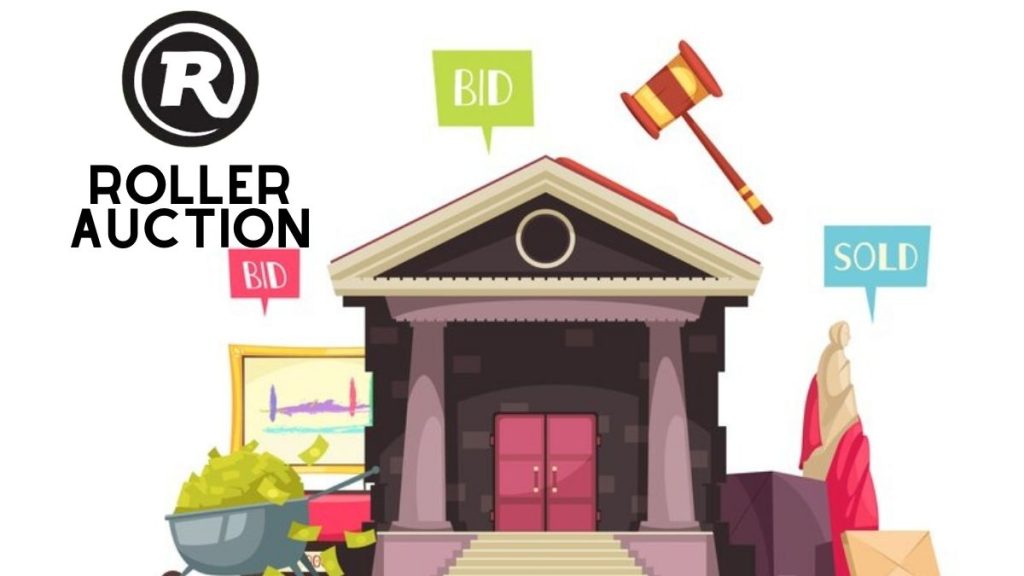Auctions in today’s fast-paced world are more than simply a place to purchase and sell products; they’re also a thrilling mix of business, rivalry, and camaraderie. Among the many variations of auctions, the “roller auction” has recently attracted a lot of interest. Discover the ins and outs of roller auctions and find out why they have captivated the attention of both buyers and sellers with this in-depth guide.
Roller auctions, often known as “heavy equipment auctions,” are a novel and exciting way to trade goods. Whether you are a seasoned pro at auctions or just starting out, knowing what to expect from a roller auction is crucial.
Understanding Roller Auction
What Is a Roller Auction?
In a roller auction, a wide variety of objects, especially large pieces of machinery and industrial tools, are sold to the highest bidder. The “roller” in “roller auction” usually refers to the large pieces of construction machinery that are up for bid, such as road rollers, excavators, and bulldozers.
The potential of roller auctions to attract a wide variety of bidders has contributed to their rise in popularity. They used to specialize in construction tools, but now they sell a wider variety of products. This development has broadened the pool of potential buyers and sellers for roller auctions.
The Evolution of Roller Auctions
The first roller auction took place in the early 20th century, when rollers and other heavy machinery and industrial equipment were indispensable in the building and manufacturing industries. Historically, these auctions have catered largely to the excess equipment and new asset needs of the construction and industrial sectors.
The scope of roller auction has grown over time. These days, they showcase much more than just heavy machinery, including cars, tools, gadgets, and even furniture. Because of this expansion, roller auction are now complex affairs serving many sectors and types of customers.
Items Sold at Roller Auction
The enormous variety of goods up for grabs is a distinctive feature of roller auctions. Both general consumers and enterprises with specialized wants and needs benefit greatly from this selection.
A Wide Array of Choices
Roller auctions are a goldmine of possibilities. Roller auction provide a venue to peruse a wide and varied selection of products, whether you’re a contractor searching for heavy machinery for a building project, a farmer in need of agricultural equipment, or a hobbyist hunting for treasures.
Excavators, tractors, and forklifts can be on sale, along with classic automobiles, modern power equipment, and even some gadgets. There’s bound to be something here that piques everyone’s attention.
The Appeal of Used Equipment
Used machinery is a common item up for bid at roller auction. Those looking to save money or do their part for the environment would appreciate this. Reasons why
Cost Savings: The price of used machinery in roller auction is typically much lower than that of new machinery. Because of its low price, it is a viable choice for companies and individuals that want to buy expensive assets without going bankrupt.
Environmental Sustainability: Buying pre-owned machinery helps keep machines in use for longer and so cuts down on production. The reduced environmental impact of production and disposal helps achieve sustainability targets.
Quality Assurance: Roller auctions typically feature several goods in excellent condition. Used machinery that has been well-maintained by its previous owners is often available for purchase.
In conclusion, roller auctions provide not just heavy machines but a wide range of goods that give purchasers economic benefits and environmentally conscious options.
Benefits of Participating in Roller Auctions
Cost Savings
Savings in roller auctions are often much larger than those from regular stores. Roller auctions are a great place to find deals on everything from large pieces of machinery for your business to inexpensive hand tools.
In contrast to the inflated pricing sometimes observed in retail environments, auctions encourage bidding wars, allowing things to be sold at prices closer to their true market value.
Variety and Availability
The enormous diversity of goods on offer at roller auction is one of their main draws. Customers who are either on the hunt for a certain item or who simply enjoy the thrill of the unexpected will appreciate this feature.
Roller auction are similar to a large, specialized store where a wide variety of goods are sold under one roof or, in the case of online auctions, on a single website.
Environmental Sustainability
Roller auction are becoming increasingly important in the circular economy as the global focus on sustainability grows. Giving previously-used things a fresh lease on life helps cut down on the need for new manufacture, which in turn benefits the environment.
Those concerned about their impact on the environment should be assured that bidding on secondhand equipment at roller auctions is a viable option. This feature is attractive to both individuals and businesses that want to show their support for environmentally friendly policies.
Sellers may efficiently liquidate items and decrease waste through roller auctions, while purchasers can save money, have more options, and help the environment.
How Roller Auctions Work
Registration
Pre-registration is often required for participation in roller auction. In order to verify the identity and financial stability of potential buyers, bids must provide necessary information and, in some cases, a deposit.
Auctioneer efficiency and the security of the bidding process depend on participants registering in advance.
Bidding Process
Roller auction bidding is a lively and exciting part of the event. Buyers absolutely must know how this thing functions before they buy it.
Auctioneer-Led Bidding: An auctioneer handles the bidding at conventional, in-person roller auctions. An auctioneer displays the merchandise, gives a rundown of its condition, and starts the bidding process. Paddle raises and vocal bids are used to indicate interest from potential buyers.
Online Bidding: Bidding in roller auctions takes place over a safe and secure online platform, such as a website or mobile app. From the convenience of their own homes or offices, bidders can browse the catalog of available items, put their bids, and track the auction’s progress in real time.
Here are some important details to keep in mind during the bidding process:
- Competitive bidding occurs when bidders offer increasingly higher prices.
- At the close of bidding, the person who submitted the highest bid receives the item.
- Minimum bid increments require bids to grow by a specified amount, and are common in auction settings.
- If additional bids are put close to the end of the auction, the auctioneer or online platform may prolong the bidding period or use a countdown timer to stimulate competitive bidding.
Payment and Collection
When a bidder wins an auction, the following step is to finalize the sale and make arrangements for the item’s pickup or delivery.
Payment: In most cases, successful bidders are expected to pay immediately after being notified of their success. Cash, debit cards, wire transfers, and credit cards are some of the options for making a purchase. If you want to guarantee your purchase, you need to be ready to pay for it quickly.
Collection or Delivery: Buyers may be required to pick up their purchases from the auction site or arrange for shipping and delivery. It is vital to comprehend the logistics and follow the auction’s recommendations for picking up items.
A successful and enjoyable auction experience relies on a smooth payment and collection process.
Choosing the Right Roller Auction
Research is Key
Do your homework before entering a roller auction to maximize your chances of success. Here are some crucial factors to think about:
Item Knowledge: Get to know what’s available, especially if there’s certain gear or categories that pique your interest. If you know their details, such their condition and current market value, you can make better choices.
Auction Details: Always do your homework before attending or bidding at an auction. Learn about the auction’s start and end times, as well as the location (if it’s a live event) and registration process.
Seller Reputation: Investigate the background of the auction house and the sellers if you can. Auctions hosted by reputable hosts and vendors are more likely to be honest and dependable.
The Importance of Inspection
Inspect the products you plan to bid on as much as possible. Items like heavy machinery, the condition and performance of which depend critically, are especially in need of thorough inspection.
On-Site Inspections: Attending a preview or inspection day before a live auction gives you the chance to go at the merchandise up close. You can check their functionality, functionality, and condition.
Online Inspections: Although physical inspections may not always be possible with online auctions, bidders should still be able to rely on accurate descriptions, high-quality photos, and even videos. Please read over this information thoroughly and get in touch with any queries you may have.
Having an item inspected before winning it gives you peace of mind and lessens the likelihood of any unpleasant surprises.
Tips for Successful Bidding
Strategy and thought must go into bidding at roller auction. Here are some helpful hints to increase your bids’ chances of being accepted:
Setting a Budget
Make a plan for how much money you can spend at an auction and how much those items are worth before you go. Setting a firm budgetary cap helps curb excessive bids and expenditure.
Patience Pays Off
It’s simple to overpay in the heat of a bidding fight. But waiting at the right moment can pay well. Hold off on placing bids until the time is right and don’t feel obliged to outbid everyone else unless the item is extremely rare or valuable.
Bidding Strategies
Successful bidders typically use a variety of tactics to increase their odds:
Proxy Bidding: Proxy bidding is a feature commonly found in online auctions that allows you to set your maximum bid in advance. If you are in the lead, the algorithm will automatically raise your bid up to your maximum.
Sniping: There are always those who wait until the very end of an auction to submit a bid. Sniping is a strategy that can catch rivals off guard. However, time is crucial.
Bidding Increments: Pay attention to the minimum and maximum bid increments. Your bidding approach may change depending on the item because some have lower increments than others.
Bid Nudging: Increasing your bid gradually over time may cause other bidders to pause and reconsider.
Research Your Competitors: Take note of the bidding trends and inclinations of regular auction attendees. One of the keys to successful strategy is familiarity with the opposition.
Stay Informed: Be aware of how the auction is going and prepared to change your approach if necessary.
Keep in mind that your strategy may need to change depending on the specifics of the auction you’re participating in. The trick is to maintain a degree of adaptability while still meeting your financial and bidding targets.
Safety Measures at Roller Auctions
Even though roller auctions have a good reputation and are usually safe places to do business, you still need to be careful.
Ensuring a Secure Transaction
Use Trusted Auction Platforms: Pick sites that have been verified as safe and secure by others before bidding on anything. Check for secure authentication methods and encrypted payment processing.
Protect Your Personal Information: Don’t be careless with your real-life and virtual-world financial and personal information. Make sure all financial dealings are conducted over safe methods.
Verify Seller Credentials: If you can, try to find out more about the seller or auction host to see if they have a good reputation. Online stores with a lengthy history of satisfied customers are usually safe bets.
Read Terms and Conditions: Learn the auction’s rules and regulations inside and out. Take note of when payments are due, how items should be picked up, and who to contact if a problem arises.
Avoiding Common Pitfalls
Overbidding: Don’t overbid on products because you couldn’t stick to your budget. When bidding on impulse, it’s easy to spend more than you can afford.
Inadequate Inspection: Make use of in-person inspection opportunities if possible. Don’t place bids on anything before you’ve had a chance to look at them closely.
Late Arrivals: If the auction is physically located somewhere, you should be there early to check in and inspect the goods. Those who are late risk missing out on important information or opportunities.
Misunderstanding Terms: Be sure you fully grasp the buyer’s premium (extra costs), payment options, and any taxes or other charges associated with the auction.
Failure to Read Descriptions: Always do your research while bidding on something on eBay or another online auction site. Disappointment can result from misunderstanding the item’s condition.
Considering these precautions will allow you to participate in roller auctions with ease and assurance.
Online vs. On-Site Roller Auctions
Whether you want to bid in a roller auction online or in person is up to you and your situation. There are good points and bad points to each format.
Online Auctions
Pros:
Convenience: There is no longer any need to physically attend auctions thanks to the convenience of online bidding.
- Accessibility: Participants in online auctions can be located anywhere in the world.
- Extended Bidding Period: If fresh bids are put close to the end of an online auction, the bidding time may be extended. This guarantees that every potential bidder receives a level playing field.
- Detailed Information: Typical features of online auctions include in-depth item descriptions, high-resolution images, and even videos.
Cons:
- Limited Physical Inspection: It’s possible that people who shop online will have less of a chance to personally scrutinize the goods. It’s not risk-free to rely only on digital data.
- Competition: Many more people may be interested in bidding on an item in an online auction.
On-Site Auctions
Pros:
- Physical Inspection: When you attend a live auction, you can examine the objects up close and make an accurate judgment on their condition.
- Networking: In-person auctions allow buyers, sellers, and experts to network face-to-face.
- Immersive Experience: Those who relish the thrill of the live bidding process will find the atmosphere of an in-person auction to be nothing short of electrifying.
Cons:
- Travel and Time: There may be time and financial commitments associated with attending an on-site auction.
- Limited Audience: The number of interested buyers at an in-person auction may be lower because of its probable regional focus.
In conclusion, you should consider your personal tastes, geographical proximity, and the objects up for bid while deciding between online and in-person auctions. Each format has its own benefits, so pick the one that best fits your needs.
The Thrill of the Bidding War
Tales from Roller Auction Enthusiasts
There are always interesting anecdotes and tales to be heard during roller auctions. Here are a few anecdotes that perfectly illustrate the heated competition:
Unexpected Wins
The exhilaration of a surprise win is something many bidders know all too well. Intense competition can yield unexpected results, such as when a bidder wins a bid on an item they first thought was out of their price range.
Last-Minute Triumphs
Last-minute bids can swing the outcome of auctions, whether they take place online or in person. Timing your offers in the final moments of an auction can win you the thing you want and leave the other bidders in shock.
Hidden Treasures
Treasures are often unearthed during roller auctions that were previously unknown to the seller. Buyers with an eye for quality and rarity have discovered valuable antiques and treasures.
These anecdotes highlight the fact that roller auctions are about more than just the act of purchasing an item; they are also about the fun of competition, the adventure of discovery, and the satisfaction of success.
The Future of Roller Auctions
Technological Advancements
Technology has been a major factor in the ever-changing landscape of roller auctions. Take a look into the crystal ball and see what lies ahead:
Online Dominance: The method that people take part in auctions has changed drastically since the introduction of online bidding platforms and mobile apps. Online auctions are already very common and convenient, and this trend is only expected to grow as technology improves.
Virtual Reality: Bidders may enjoy more immersive experiences if online auctions incorporate VR and AR technologies. The online auction experience could be improved with the use of virtual reality auctions by allowing bidders to virtually view things.
Blockchain for Transparency: Auction house transparency could be improved with the use of blockchain technology by keeping track of the history of valuable objects before they are sold.
Sustainability Initiatives
The importance of roller auctions in the circular economy is expected to grow as sustainability gains prominence worldwide. How they can help is outlined below.
Reuse and Recycling: Reselling goods is already possible through roller auctions. More eco-friendly measures, such recycling and reusing programs for decommissioned machinery, could be implemented in the future.
Green Energy and Equipment: The growing need for sustainability in numerous industries may lead to an increase in the availability of environmentally friendly equipment and machinery at auctions.
Carbon Neutrality: Offsetting emissions from transportation and logistics for live auctions may be a top priority for carbon-conscious auctioneers.
The recycling, reusing, and long-term viability of roller auctions make them a natural fit with international initiatives to cut down on waste and lessen environmental damage.
Conclusion
To sum up, roller auction provide a lively and varied marketplace where buyers and sellers may interact and trade a wide variety of goods. From their beginnings in the trade of heavy machinery, these auctions have expanded to include anything from construction tools and collectibles to everyday household items.
Setting a budget and developing strategic bidding techniques are only two of the many considerations that must be given prior to taking part in a roller auction. Taking necessary precautions is essential for a smooth and secure transaction, whether it takes place online or in person.
Technology will improve the auction experience, and sustainability initiatives will help roller auctions contribute to global environmental goals, therefore the future of roller auctions is bright.
Roller auctions provide participants of all experience levels—from seasoned bidders to curious newcomers—with not only the chance to make purchases, but also the thrill of competition, the adventure of exploration, and the possibility of making worthwhile purchases. So, maybe you should give roller auctions a try and see what all the excitement is about for yourself.
FAQs
Q: What is the difference between a roller auction and a traditional auction?
The fundamental distinction is in the nature of the merchandise offered. Traditional auctions sell a wider variety of commodities, from art to antiques to furniture, than roller auctions, which specialize in large machinery and industrial equipment.
Q: Are roller auctions a good place to buy vintage items?
Yes, roller auctions may be a great place to find antiques, especially those with a connection to the history of manufacturing or building. Collectors might find rare and interesting examples of vintage machinery and equipment.
Q: How can I avoid overbidding at a roller auction?
Prior to the auction, decide how much money you want to spend. If you overbid, you can end up losing money. Be self-disciplined and don’t let yourself go beyond your budgeted spending.
Q: What are some common misconceptions about roller auctions?
It’s a frequent misunderstanding that everything sold in roller auctions is in bad shape. Many products are actually in great condition and provide great value. Another common misconception is that roller auctions only sell items related to a single industry, but in fact they sell a far wider variety of products than that.
Q: Can I participate in roller auctions from anywhere in the world?
With the rise of online bidding platforms, roller auctions are open to anybody, assuming they meet the auction’s registration requirements and other stipulations. For overseas bidders, the accessibility of online auctions is a major perk.







